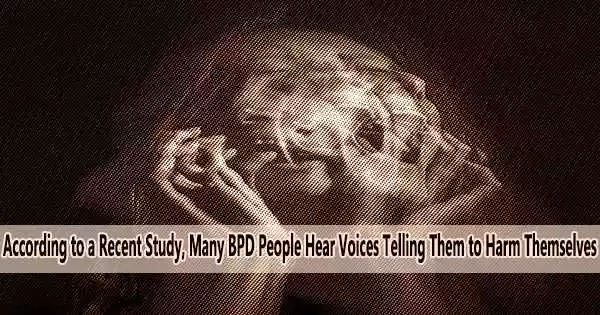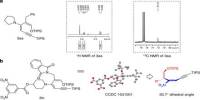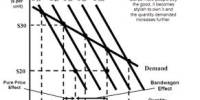Borderline Personality Disorder (BPD) is a mental health disorder characterized by intense and unstable emotions, distorted sense of self, impulsivity, and unstable relationships with others. People with BPD often struggle with abandonment issues and have a pattern of intense and unstable relationships.
According to recent studies, many patients with borderline personality disorder (BPD) have hallucinations. According to the study, which included a sample of BPD patients who experienced auditory hallucinations, some forms of hallucinations are more frequent than others, with themes of self-harm being prevalent within voices heard.
The study was conducted by Hayward et al. and published in a 2022 edition of the journal Clinical Psychology and Psychotherapy. The findings revealed that patients with BPD frequently experience voices speaking directly to them in their hallucinations, with 93 percent of respondents reporting this as opposed to 52 percent who reported hearing voices conversing with one another.
The majority (78 percent) said that the voices discussed topics that related to them, with 78 percent saying that the voices tell them what to do, although only 29 percent said they do what the voices tell them to do.
According to research, 50 to 90 percent of BPD patients experience auditory hallucinations. As a result, caregivers and doctors should be aware that many BPD patients experience hearing voices and that some may be at risk of self-harm.
Themes of Self-Harm in Hallucinations with BPD
76 percent of those with BPD reported hearing voices telling them to injure themselves, and 33 percent reported hearing voices telling them to hurt others. The researchers looked into whether hallucinations frequently involved issues of self-harm and injuring others.
Many people with the disorder interacted with the voices, with 60 percent having a conversation with them (in which they heard the voices answering back), but only 29 percent said that they did whatever the voices told them to do. As a result, certain BPD patients may be at risk for self-harm because of the auditory hallucinations.
Insight into Hallucinations in BPD
When the researchers looked at whether patients with BPD had insight into the idea that the voices were just hallucinations, they discovered that 58 percent of them did, even though 69 percent of them understood that hearing the voices was a symptom of their mental illness. This implies that, despite the fact that persons with BPD may be aware of the connection between the voices and the condition, the voices nonetheless sound and feel real to them.
Only 31% of participants claimed that the voices sounded like people they know, and most people tended to hear a variety of voices, with only 29% hearing only one sort of voice when hallucinating, therefore in most cases, the hallucinations represented strangers.
Voices Inside or Outside the Head
51 percent of people believed the voices came from inside their heads, while 49 percent believed they came from outside. The experience of auditory hallucinations was linked to the sense of derealization that persons with BPD may have. Of the sample, 23% reported that they hear voices more frequently when their surroundings seem surreal, although 13% linked the hallucinations to using alcohol or drugs.
Hallucinations Distressing to People with BPD
According to 69 percent of BPD sufferers, auditory hallucinations are among the most disturbing and high-impact symptoms of the condition, making it one of the most distressing symptoms of BPD. Participants in the study also gave moodiness, unstable relationships, feeling furious, and feelings of emptiness high impact ratings for other symptoms.
Hallucinations in BPD and the Brain
The same team of researchers published a study focusing on functional magnetic resonance imaging (fMRI) data from a sample of 48 participants with BPD who participated in the study and had one structural brain scan, 32 minutes of tasks, and functional MRI scans. The study was published in the International Journal of Neuropsychopharmacology in 2022.
The 32 minutes of tasks were split into four eight-minute segments, with the first segment consisting of a resting-state scan and the following three tasks being presented in a random order. According to the findings, those with BPD who experienced severe auditory hallucinations had weaker connections in their brains between the anterior cingulate and the bilateral insular cortices.
According to the research, hearing auditory hallucinations in persons with BPD increased blood oxygenation in the area of their anterior cingulate cortex more than hearing real voices or ones they had purposefully imagined. This demonstrates why many BPD sufferers find auditory hallucinations to be so disturbing and supports the belief that the voices are genuine.
Supporting People with BPD
Despite the small sample size, the current research provides valuable insight into auditory hallucinations as symptoms that some BPD sufferers experience. Clinicians and those who provide care for BPD sufferers need to be aware of these symptoms due to the potential for distress and self-harm.
According to studies, many people with the disease experience their hallucinations as extremely real, and this was confirmed by fMRI data concerning brain activity, illuminating why having hallucinations may be so upsetting for those with BPD.
The latest research demonstrates that many BPD sufferers who experience auditory hallucinations claim that the voices instruct them to hurt themselves, and about one-third may be in danger of acting on the voices’ commands. As a result, those who care for people with BPD must be alert to the possibility of self-harm among those who suffer from the disorder and experience auditory hallucinations.
















